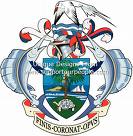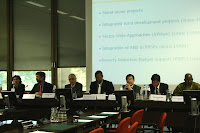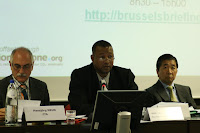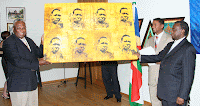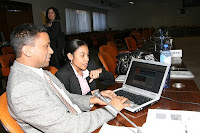Symposium sur la Constitution des Seychelles et la réflexion constitutionnelle européenne, le 7 octobre 2008, Parlement européen, Bruxelles,
Un séminaire sur l'avenir de la Constitution des Seychelles a eu lieu le 7 octobre 2008 au Parlement européen à Bruxelles, qui a réuni des représentants de la République des Seychelles, des experts constitutionnalistes européens, des députés membres ainsi que le secrétariat de la commission des affaires constitutionnelles du Parlement européen, et une représentante de la Commission européenne.
L’événement - une initiative de l’Ambassade des Seychelles à Bruxelles - a été organisé dans le cadre d’un exercice national actuellement en cours aux Seychelles, pour évaluer la Constitution des Seychelles vis-à-vis les développements clé survenus depuis son adoption en 1993 sous la 3ème république des Seychelles.
La délégation des Seychelles a été menée par M. Francis MacGregor, le Président de la Cour d’Appel des Seychelles, le président du comité judiciaire pour l’exercice national, et l’ancien ‘Speaker’ de l’Assemblée nationale des Seychelles.
Les points principaux du séminaire :
A titre liminaire, le Président de la commission des affaires constitutionnelles du Parlement européen, M. Joe Leinen, a rappelé que l'Union européenne elle-même était confrontée depuis plusieurs années à des problématiques constitutionnelles, hier avec le Traité constitutionnel, et aujourd'hui avec le Traité de Lisbonne.
M. MacGregor a ensuite brièvement retracé l'histoire de la Constitution et du processus constitutionnel, de la Bible à la démocratie moderne. Puis il a présenté le contexte dans lequel l'exercice national de révision constitutionnelle se déroulait aux Seychelles, et quels étaient les enjeux pour le pays.
Le Professeur Kotzur a quant à lui résumé les dernières évolutions de la pensée constitutionnaliste internationale, et énuméré un certain nombre de perspectives permettant de nourrir le débat concernant la Constitution des Seychelles.
Dans le cadre des débats a notamment été abordée la question du degré de détail nécessaire pour la description des procédures et de la règlementation. Dans la même ligne, la question de la longueur de la Constitution a été soulevée, les intervenants s'accordant sur le fait qu'une Constitution laissait d'autant plus de liberté aux juges chargés de l'interpréter que celle-ci était courte. A cet égard, le fait de rédiger de manière très détaillée le texte pouvait révéler une certaine méfiance vis à vis du juge. Cependant, certains points pouvaient être plus développés que d'autres et l'on pouvait ainsi épouser une "précision à géométrie variable", à l'instar de ce qui avait été fait dans la Constitution américaine.
Par ailleurs, l'opportunité de faire figurer le mode d'élection du Président dans la Constitution a fait l'objet de débats. Il pouvait être utile de ne pas figer le régime dans la Constitution.
Des thèmes tels que l'interprétation des droits de l'homme et la place de la jurisprudence du comité des droits de l'homme des Nations Unies, la liberté d'expression et la transparence, ainsi que les garanties constitutionnelles contre la discrimination ont également été débattus.
Les différentes procédures de réforme constitutionnelle ont été évoquées, ce qui a soulevé la question de savoir qui faisait réellement la Constitution (le législateur, le rapporteur, le peuple). Le déroulement des référendums a fait l'objet de quelques remarques.
Il est apparu à la fin du débat que la Constitution pouvait également représenter un champ au sein duquel pouvait se dérouler les débats politiques. On pouvait insérer des clauses d'ouverture permettant d'intégrer certaines évolutions sans nécessairement réviser l'ensemble de la Constitution.
En conclusion, M. MacGregor s'est dit très satisfait de cette rencontre, qu'il a qualifiée d'expérience riche et utile pour la réflexion en cours aux Seychelles.
